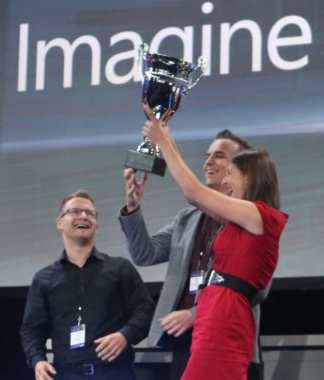| Imagine Cup Winners 2017 |
| Written by Sue Gee | |||
| Saturday, 29 July 2017 | |||
|
Health projects dominated this year's Imagine Cup and X.GLU, the team from the Czech Republic who lifted the trophy, won the contest with a smart glucose meter designed to help children with diabetics better cope with their condition.
This year, 2017 was the 15th anniversary of the Imagine Cup and Microsoft doubled the top prize to $100,000 as well as stipulating that one or more Azure Services should be included in all the student projects entered into the contest which started lat October. After a series of regional and national heats, last week 54 teams from 39 countries assembled at Microsoft's Redmond campus for the final rounds with 40 percent of them focused on the medical field. Over the course of two days the the field was narrowed to the final four that would face the panel of three judges to compete to be the next Imagine Cup champion. You can see an overview of the 2017 Imagine Cup Finals in this video, and it ends with the announcements of the winners at the final ceremony presided over by Microsoft's Executive Vice President of the Cloud and Enterprise, Scott Guthrie:
Fourth place went to Team NeuroGate of Canada, which created a solution that uses Microsoft Kinect motion data and machine learning to analyze gait patterns and diagnose potential neurodegenerative diseases. In third place, and awarded $15,000 and a $25,000 Azure grant was Team Nash, from Instituto Tecnologico de Buenos Aires, Argentina, which created a platform to reduce response times in natural disasters using drones. Second place winners, Team Oculogx, which created a mixed reality app that uses Microsoft HoloLens and Azure to improve order picking in warehouses come from Georgia Institute of Technology. Its prize was $25,000 and a $25,000 Azure grant. The team that won the top $100,000 cash prize, a $125,000 Azure grant and a mentoring session with Microsoft CEO Satya Nadella, is X.GLU, made up of three students from Czech Technical University in Prague. X.GLU's project combines hardware and an Azure cloud-based solution to help people with diabetes, in particular children, to cope better with the symptoms ov the disease. The hardware designer is Marek Novak, who is pursuing a master’s degree in radio-electronics and optoelectronics. Working on the cloud-based infrastructure are Tomas Pikous, a graduate student studying software engineering and Barbora Suchanova, who is pursuing her master’s degree in software engineering and focuses on the design and development of mobile applications for Windows Phone and Android platform. X.GLU's protoype glucose meter is thinner than of the currently available models and built using off the shelf parts to keep costs down. It has no buttons and is controlled entirely from a smartphone app, and powered by an NFC connection. The disposable blood analysis strip doesn’t actually need any power, so only a little is used to transmit the small amount of data it produces. Its cloud-based infrastructure allows caregivers or emergency contacts to see the child's glucose levels or get alerts if, say,a test isn't recorded on time. All four of these projects sound really worthwhile and demonstrate how much is achieved year on year by participants in the Imagine Cup. Addressing the semi-finalists earlier in the week Satya Nadella said: “In a time like this, where every walk of life in every society and every economy is being fundamentally changed and shaped by digital technology, developers like you are going to change the world. You’re going to bend that curve of progress.” You can discover more about all the finalist teams and their projects here. More InformationRelated ArticlesMicrosoft Student Contests Emphasize Azure
To be informed about new articles on I Programmer, sign up for our weekly newsletter, subscribe to the RSS feed and follow us on Twitter, Facebook or Linkedin.
Comments
or email your comment to: comments@i-programmer.info
|
|||
| Last Updated ( Saturday, 29 July 2017 ) |




